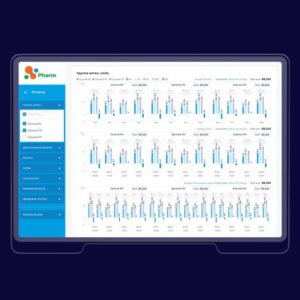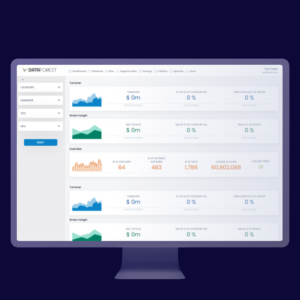- Home
- /
- Services
- /
- Data Engineering
- /
- Generative AI Data Infrastructure
Generative AI Data Infrastructure
Our Gen AI Data Infrastructure expertise aims to convert unstructured data into high-quality and AI-ready resources that power machine learning and generative AI pipelines. This is accomplished through AI dataset management, governance frameworks, and scalable processing technologies.
AI Data Management Infrastructure Solutions
Data Infrastructure for AI in Industries
Healthcare AI Data Infrastructure
- Develop secure, HIPAA-compliant data pipelines for medical datasets
- Implement advanced anonymization and AI data privacy techniques
- Enable AI model training for precision diagnostics and predictive healthcare analytics
Finance AI Data Platform
- Create secure and regulatory-compliant financial data management systems
- Support risk modeling and algorithmic trading data preprocessing with cross-domain data integration
- Ensure strict data governance and integrity for financial machine-learning models
Manufacturing AI Data Hub
- Design comprehensive sensor and process data collection infrastructure
- Develop advanced data preprocessing techniques for industrial IoT datasets
- Enable predictive maintenance and quality control AI model training
Autonomous Vehicles Data System
- Build high-performance sensor data fusion and management platforms
- Support simulation and real-world driving scenario dataset processing
- Facilitate ML model training for autonomous perception through computational resource optimization

Research AI Data Network
- Create scalable, cross-disciplinary research data management platforms
- Integrate multi-source scientific datasets with advanced interoperability
- Support collaborative AI model development through enterprise AI data strategy
Telecom AI Data Infrastructure
- Develop network performance and customer interaction AI data center infrastructure
- Enable intelligent service optimization through advanced data analytics
- Support predictive customer experience and network management AI models
Scale your AI without the headaches – our data infrastructure makes it easy and efficient.
Success Stories in Generative AI
Check out a few case studies that show why VOLTERA will meet your business needs.
Stock relocation solution
The client was faced with the challenge of creating an optimal assortment list for more than 2,000 drugstores located in 30 different regions. They turned to us for a solution. We used a mathematical model and AI algorithms that considered location, housing density and proximity to key locations to determine an optimal assortment list for each store. By integrating with POS terminals, we were able to improve sales and help the client to streamline its product offerings.

Client Identification
The client wanted to provide the highest quality service to its customers. To achieve this, they needed to find the best way to collect information about customer preferences and build an optimal tracking system for customer behavior. To solve this challenge, we built a recommendation and customer behavior tracking system using advanced analytics, Face Recognition, Computer Vision, and AI technologies. This system helped the club staff to build customer loyalty and create a top-notch experience for their customers.

Performance Measurement
The Retail company struggled with controlling sales and monitoring employees’ performance. We implemented a software solution that tracks sales, customer service, and employee performance in real-time. The system also provides recommendations for improvements, helping the company increase profits and improve customer service.

Supply chain dashboard
The client needed to optimize the work of employees by building a data source integration and reporting system to use at different management levels. Ultimately, we developed a system that unifies relevant data from all sources and stores them in a structured form, which saves more than 900 hours of manual work monthly.

Michelle Nguyen
Senior Supply Chain Transformation Manager Unilever, World’s Largest Consumer Goods Company
View case study →

Data Infrastructure for AI Technologies
Arangodb
Neo4j
Google
BigTable
Apache Hive
Scylla
Amazon EMR
Cassandra
AWS Athena
Snowflake
AWS Glue
Cloud
Composer
Dynamodb
Amazon
Kinesis
On premises
AZURE
AuroraDB
Databricks
Amazon RDS
PostgreSQL
BigQuery
AirFlow
Redshift
Redis
Pyspark
MongoDB
Kafka
Hadoop
GCP
Elasticsearch
AWS

Overfitting? Data leakage?
Not on our watch. We’ve got the tools to keep your AI sharp.
AI Data Infrastructure Process Steps
Data Sourcing
01
Data Cleaning
02
Privacy & Compliance
03
Scalable Storage
04
Bias Mitigation
05
Real-Time Integration
06
Users' Feedback
06
Resource Optimization
07
Users' Feedback
06
Deployment & Monitoring
08
Users' Feedback
06
The Challenges of Data Infrastructure for AI
VOLTERA creates adaptable and secure data infrastructure that underpins mitigation through automation and AI-powered solutions, which are crucial to addressing these challenges at scale.
Ensuring Real-Time Data Streaming & Processing
Designing Scalable Systems for Growing ML Datasets
Implementing Privacy-Preserving Techniques
Ensuring Real-Time Data Streaming & Processing
Designing Scalable Systems for Growing ML Datasets
Implementing Privacy-Preserving Techniques
Optimizing Computational Resources
MVP Development Service Possibilities
Our approach focuses on maximizing learning and minimizing waste through strategic, agile, and user-centric MVP product development with Generative AI.







